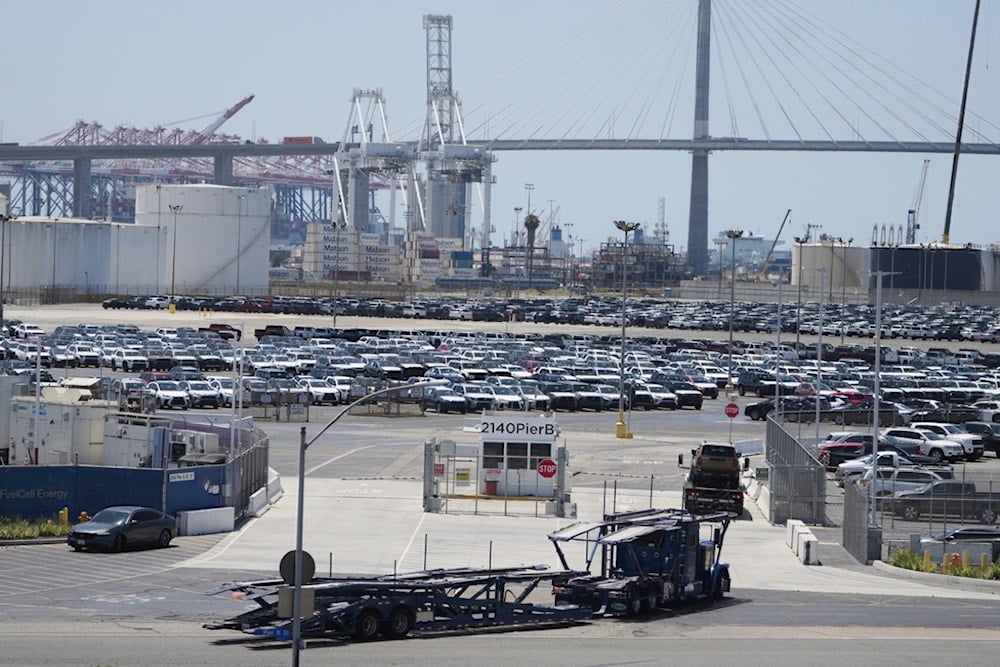Japan's exports suffer sharpest decline in four years amid US tariffs
Japan's exports suffered their steepest drop since 2021 in July, driven by US tariffs that slashed auto shipments despite a recent trade deal aimed at easing tensions.
-

Rows of new vehicles sit near a port terminal at the Toyota Logistics Services Inc. lot on Wednesday, July 23, 2025, in Long Beach, California. (AP Photo/Damian Dovarganes)
Japan experienced its sharpest fall in exports in more than four years last month, with shipments to the United States hit particularly hard, according to figures released by the Finance Ministry on Wednesday. The last time Japan saw such a steep drop was in early 2021, when global trade was still reeling from the aftershocks of the COVID-19 pandemic.
Overall exports fell 2.6% compared with the same month a year earlier, while sales to the US plunged 10.1%. The automobile sector bore the brunt: vehicle exports, including cars, buses, and trucks, plummeted 28.4%, and auto parts declined 17.4%. Automobiles remain the backbone of Japan's industrial base, and this sudden contraction poses a direct challenge to an industry that employs about eight percent of the national workforce.
The downturn reflects the ongoing impact of tariffs introduced by US President Donald Trump, who has placed duties on imports from multiple countries in a bid to bolster American manufacturing and narrow the US trade deficit. On Japanese goods, Trump initially imposed across-the-board levies of 10% and an additional 27.5% duty on cars. Analysts note that these new barriers came on top of an already fragile global trade environment, compounding pressures on Japan's export-led growth.
Tokyo managed to secure a deal with Washington last month that reduced a threatened 25% "reciprocal" tariff to 15%. The rate on Japanese cars was similarly lowered to 15%, down from 27.5, though Tokyo has expressed frustration that the adjustment has not yet taken effect. Even at 15%, the tariff remains well above the pre-Trump level of 2.5%, underlining the structural disadvantage now facing Japanese automakers in the world's largest consumer market.
Resilient Economy
Despite these headwinds, Japan's broader economy has shown surprising resilience. Data released last week revealed that the world's fourth-largest economy grew at an annualized rate of 1.0% in the second quarter, exceeding expectations. Capital spending rose 1.3%, reflecting companies' determination to sustain investment even as earnings forecasts come under pressure. Toyota recently cut its profit outlook by 16%, while Sony revised its own upwards by 4%.
Corporate sentiment remains divided. A Reuters-Nikkei survey found that three-quarters of Japanese firms view the July deal with the US favorably, suggesting relief at avoiding steeper tariffs. Yet nearly four in ten expect the agreement to dent profits, and only one-fifth anticipate any gains. Many manufacturers have so far absorbed the additional costs rather than pass them to American consumers, but analysts warn this strategy may prove unsustainable if tariffs remain in place.
Tariff Uncertainty
Negotiations remain in flux. US Commerce Secretary Howard Lutnick said the formal trade documents Japan has been pressing for will be ready "within weeks," a move intended to provide legal clarity and reassurance to Japanese exporters.
Tensions had flared earlier this month when a US executive order appeared to stack new reciprocal tariffs on top of existing duties, raising fears in Tokyo that the 15% ceiling would be undermined.
Japan’s chief negotiator rushed to Washington and was assured the US would cap tariffs at 15% and refund excess payments, though the White House has yet to confirm this publicly. The gap between private assurances and public statements continues to fuel unease among Japanese companies.
Read more: Toyota slashes forecast as US tariffs threaten $9.5 billion hit

 4 Min Read
4 Min Read










